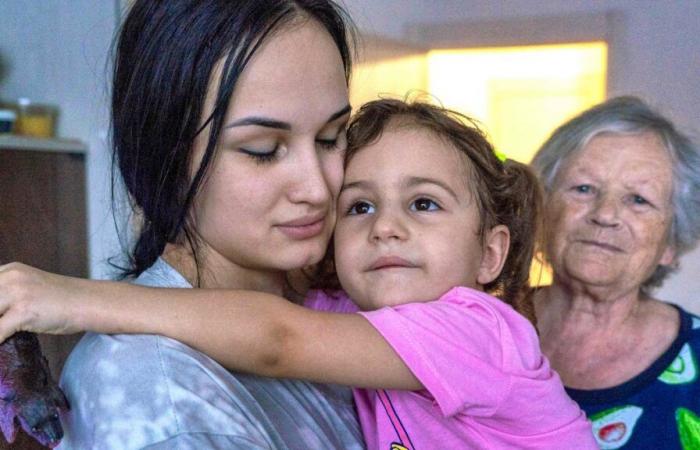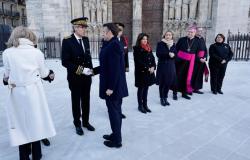Anastassia and her daughter Darina are finally reunited thanks to the help of Alexeï, a Ukrainian soldier.
AFP
When the Ukrainian army entered Russia for its surprise offensive in the Kursk region last August, Anastassia Gridina found herself separated from her 3-year-old daughter, Darina, by the new front line. Four months of anguish followed for the young woman living near Moscow, while the little girl was stuck in territory occupied by kyiv troops.
Last week, Darina finally returned to Russia, along with around fifty civilians from the Kursk region, after rare negotiations between Moscow and kyiv. If Darina and Anastassia were able to be reunited, it was in part thanks to the efforts of a Ukrainian in the occupied zone. “I am so grateful to him,” says Anastassia Gridina. She claims that it is a “war correspondent” named Alexei, but, according to information from AFP, the man is a Ukrainian soldier deployed in the area.
Darina holds a small plastic horse in her hands while her mother recounts her journey. It all began on August 6, when Ukrainian soldiers entered Russia and seized hundreds of square kilometers, two and a half years after the launch of a large-scale Russian offensive against Ukraine.
Anastassia is in Moscow, where she has gone to look for work, temporarily leaving her child with her grandmother in the Kursk region. The Ukrainian incursion takes the residents by surprise. Families are separated, like Anastassia’s.
Single link
For about four months, Darina and her great-grandmother lived in a Ukrainian-controlled area, first in their home, then in a half-destroyed school complex in the town of Soudja. Contact with the rest of Russia is then impossible, the telephone network being cut.
The Ukrainian Alexei, who is in the Kursk region, becomes the only link between Anastasia and her daughter. The young Russian knows very little about him. She says she doesn’t even know his last name. AFP journalists identified this man and confirmed this story with him. Alexei managed to contact the young mother, who received videos of his daughter from him. Then he showed the little girl the videos sent by Anastassia.
After weeks of discussions, Alexei asks the mother to send another video, this time more official. He wants to obtain her consent on film to have Darina taken to Ukraine. From there, she will go to Belarus, then to Russia. The plan carries risks, but Anastassia agrees. “If he hadn’t gotten them out, I think they wouldn’t have left and there wouldn’t have been a way out,” she says, grateful.
“People are afraid”
Alexei tried to convince other inhabitants of the occupied villages to follow him. But “people are afraid”. Those who accept are escorted by the kyiv army to the border region of Sumy, Ukraine, before continuing their journey with the help of the Red Cross.
The “last minutes” before the reunion in Russia were unbearable, says Anastassia. When Darina sees her, she “is very surprised, exclaims ‘Mom’ and smiles,” she says. The family is now reunited, but the ordeal has traumatized the little one. She has trouble falling asleep, fearing that when she wakes up, there will be no one around her.
For four months, Darina lived in the middle of the fighting. The streets were “covered with glass, everything was destroyed,” says Tatiana, Anastassia’s grandmother.
Everyone wants the fighting to stop
Their living conditions were rudimentary in the school which served as their refuge. The Ukrainian forces distributed bread and canned goods, just enough so as not to “die of hunger”, according to her. There was no electricity, no gas, it was cold. “In the evening, we sat in the dark,” says Tatiana. Darina was too little to understand, “but I was very worried.”
Tatiana also remembers her interactions with Ukrainian soldiers. The Russian grandmother and the young Ukrainian soldiers have different interpretations of History or “who attacked who” in this conflict, Tatiana recognizes.
But they agree on the essential: the fighting must stop. “We told them that we had enough” and the Ukrainians replied the same thing, assures Tatiana. “No one needs war.”
(afp/er)






